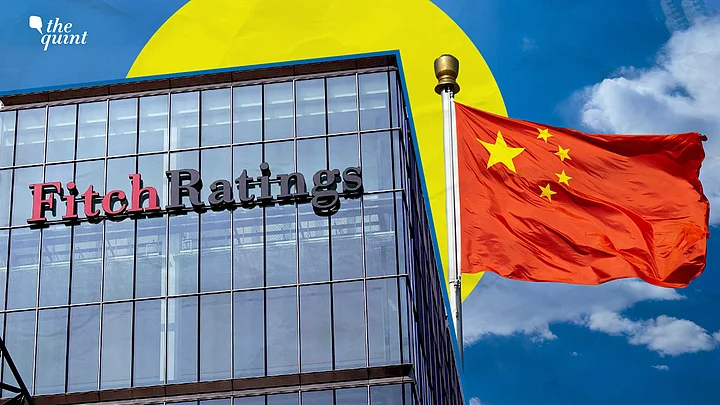(This article has been authored by a member of The Quint. Our membership programme allows those who are not full-time journalists or our regular contributors to get published on The Quint under our exclusive 'Member's Opinion' section, along with many other benefits. Our membership is open and available to any reader of The Quint. Become a member today and send us your articles on membership@thequint.com.)
On 9 April 2024, Fitch, an American credit rating agency, downgraded China's credit rating from stable to negative citing rising financial risks as the country faces economic headwinds following a similar move by Moody's in December ’23.
In January-February ’24, China's factory output and retail sales boomed simultaneously with better-than-expected exports and consumer inflation indicators. Analysts say it gave Beijing an early boost in its hopes of meeting an ambitious 5.0% GDP growth target for 2024.
But the general government deficit has gone up to 7.1% of GDP at present, up from 5.8% in 2023, the highest since 8.6% in 2020. That is the concern.
Against this backdrop, Fitch forecasts China's economic growth would slow down to 4.5% in 2024 from 5.2% last year in contrast to the likes of Citi and the International Monetary Fund (IMF) which have revised their forecasts.
How the Downgrade Impacts China?
The "revision reflects increasing risks to China’s public finance outlook as the country contends with more uncertain economic prospects amid a transition away from property-reliant growth to what the government views as a more sustainable growth model,” Fitch said in its statement.
Tax relief measures and weaker property investments which are usually a main source of local tax revenue have eroded the government’s capacity to collect tax revenues to offset the higher spending, thus, adding to its woes.
Also, another area of concern is the real estate sector, Fitch said in its report. In addition, Foreign Direct Investment (FDI) in China is also declining. It has fallen the most in 30 years.
Note that in 2023, the amount of foreign investment in the country was only 33 billion dollars which is 82% less than in 2022. Meanwhile, China's direct investment liabilities have dropped to USD 33 billion in 2023. That is the lowest since 1993.
The Ripple Effect of China’s Real Estate Setback
It should be noted that the real estate sector is very important for the Chinese economy but has been facing a serious crisis for the last few years. Evergrande, China’s largest real estate company, has gone bankrupt.
Meanwhile, it is also affecting its banking sector. This is because banks that lend to real estate developers are in trouble, the effect of which is seen in the stock market of the country.
Following this, at the closing of trading, the benchmark Shanghai Composite index was down 0.7%, or 21.20 points, at 3,027.34. The Shenzhen Composite Index, which measures stocks on China's second exchange, fell by 1.74%, or 30.52 points, to 1,720.28. The blue-chip CSI300 index declined 0.81%, or 28.78 points, to 3,504.71.
Having considered risk prevention and elimination an "eternal theme” at the central financial work conference in October, Beijing has moved to rein in local authorities with unviable fiscal standing, ordering 10 provinces and municipalities to cut infrastructure spending.
"Keeping the deficit ratio a reasonable level, 3 per cent in 2024 is conducive to stabilising growth, controlling the government debt ratio and reserving policy space to deal with risks and challenges in the future.” China’s Ministry of Finance said.
The Dragon (read China), indeed, is upset. China regretted the move and criticised the methodology for failing to reflect the positive effects of its fiscal policies on boosting economic growth.
Can India Cash In on the Crisis?
If we talk about India, the Indian stock market is constantly setting new records. Sensex recently crossed the 75,000 level in the stock market. Apart from this, Nifty also crossed the level of 22,700.
It is estimated that India's GDP will grow at a pace of 6.7 percent in 2024. While China's GDP growth estimate is 4.6 percent, in the context of foreign investment, India occupies that "sweet spot" and many big companies of the world are turning towards India.
The message is very clear – the "Elephant” (read India) just needs to be watchful of her debt levels as rating companies closely observe the same.
It is debatable if India is capable of substituting for the investment that was intended to flow to China. The likes of Vietnam, Bangladesh, Indonesia, and other growing economies are also competing aggressively. Given India’s growth trajectory, investors in all possibilities, will prioritise India.
The government has yet to implement any critical reforms that will assist in attracting more investment to the country. Maybe, after the general elections, some of these issues will be addressed to facilitate the investment influx.
(Sovik Mukherjee is an Assistant Professor in Economics at the Faculty of Commerce and Management of St Xavier’s University, Kolkata. This is an opinion piece and the views expressed above are the author’s own. The Quint doesn't endorse them.)
